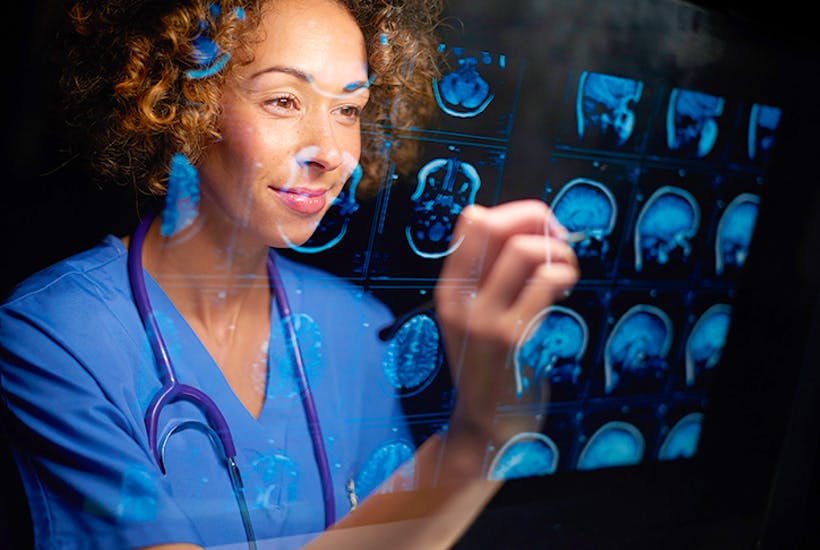Sponsored by

The NHS is one of the UK’s most cardinal institutions. It is also combating unprecedented pressures of managing ever-increasing demand with severely limited resources. People are living longer. Chronic and lifestyle-related diseases are on the rise. Trusts and hospitals are operating with a national staffing shortfall of 100,000 doctors, nurses and specialists — a gap expected to grow exponentially over the next ten years.
If something does not change soon, doctors will be less able to diagnose and treat illness in time. Without action, we are at risk of triggering an even larger national health crisis than the one we are already facing.
Recruitment, retention and training programmes are essential for addressing these staffing shortfalls. This is undisputed. There is also an opportunity for industry to help the NHS implement new technologies and ways of working that will improve patient care.
At Philips, we are looking at how best to support the NHS’s highly trained medical professionals with the power of machine learning. We take a people-centric approach to this challenge, which we call adaptive intelligence (AI). Adaptive intelligence, from our perspective, goes beyond the broader concept of artificial intelligence. It is not simply embracing robot-delivered care or creating a digital future reliant entirely on machines. Adaptive intelligence is instead a collection of intelligent and integrated tools embedded into workflows that adapt to the needs of clinicians. Medical professionals are then able to access the data and insights which support their clinical and operational intelligence, bringing their much-needed skills and specialisms to the fore.
The opportunities for AI to revolutionise the NHS are limitless. With AI, we can draw on vast data sets to develop algorithms that detect disease from imaging and tissue samples. We can identify the likelihood of people developing conditions based on their genetic makeup. We can shorten procedure times. We can make accurate diagnoses faster. We can improve patient outcomes.
AI in digital pathology
Digital pathology is a natural area to benefit from AI. Nearly 20 per cent of today’s pathologists are expected to retire in the next five years, putting pressure on the NHS to answer questions about how to most effectively manage a reduction in specialists and an increasing number of patients. Early diagnosis provides patients with the best possible chance of recovery. Therefore, it is vital to look at how we can apply digital strategies and machine learning to evolve the diagnostic process, and better support the number of pathologists in post.
Adaptive intelligence can help pathologists diagnose more patients earlier, which greatly improves chances of survival. Consider this: more than 90 per cent of women diagnosed with breast cancer at the earliest stage survive for at least five years or more, compared with 15 per cent of women diagnosed with the most advanced stage of the disease. This is just one example of the impact of early diagnosis for one type of cancer. More than four million people will be living with cancer in the UK by 2030, so it is essential that our talented pathologists are well equipped to help more patients, more quickly.
Creating a collaborative approach
At Philips, we are collaborating in two projects that will fully digitise several NHS pathology laboratories and further innovate digital pathology services for the UK.
As part of the PathLAKE (Pathology image data Lake for Education, Analytics and Discovery) cross-sector collaboration project, we are working alongside partners from University Hospitals Coventry and Warwickshire NHS Trust and with teaching hospitals and universities at Warwick, Belfast, Oxford and Nottingham. Together, we will demonstrate the diagnostic efficiency of digital pathology, computer-aided testing of pathology samples and use AI tools to more effectively personalise medicine.
Underpinned by Philips Intellisite technology, this has the potential to lead to the development of a new global industry. Utilising AI and machine learning will accelerate diagnosis and improve accuracy in disease areas such as cancer, where this is critical to patient survival.
Building this unique digital infrastructure will allow the UK to lead globally in the development and adoption of AI in health, meaning improved patient care through better and faster cancer diagnostics and treatment. The knowledge PathLAKE will unlock has the potential to radically change cancer care in the NHS, while bringing a world-leading life-sciences and technology sector into our health system.
AI tools to drive deep learning
Deriving tangible value from digitising patient records rests not just on the shoulders of clinicians and medical professionals. AI researchers and data scientists need to unlock the insights required to implement these data-driven cancer care strategies.
Our work with Glasgow’s Queen Elizabeth University Hospital is part of project iCAIRD, a pan-Scotland consortium led by the University of Glasgow and comprising partners across the NHS, academia and industry. This group has developed a system in which AI can assess digital diagnostics, pathology and radiology data within Scottish NHS pathology data. Information is consolidated in one digital location, creating one of the largest fully-digitised pathology laboratories in Europe.
iCAIRD will establish a national pathology image archive as a scalable resource available to support research and innovation in cancer across the UK. Through providing the AI tools, software and expertise to accelerate development of deep learning, we can facilitate earlier and more definitive diagnosis of various cancers.
A blueprint for future innovation
The opportunities AI presents at these new centres provide a blueprint for the drive towards more personalised treatment, freeing up clinicians to spend more time caring for patients. Moving beyond the opportunities in digital pathology, investment in large-scale genomics and image analysis will drive new understanding of how complex diseases develop.
Adaptive intelligence will continue to play a crucial role in the future of the NHS. At Philips, we firmly believe in the need to embrace this digital future by introducing intelligent systems that can work alongside the talented doctors, nurses and clinicians.
We are committed to supporting the NHS as it adopts digital solutions and technology that help and support more people and ultimately transform healthcare.
For more information on Philips and its solutions, visit: www.philips.co.uk/healthcare/nobounds.






Comments